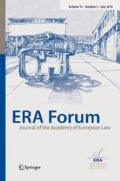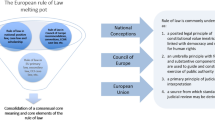Abstract
This article compares the use of two legal assistance instruments—the European Investigation Order (EIO), introduced by the Directive regarding the European Investigation Order (Directive 2014/41/EU of the European Parliament and of the Council of 3 April 2014 regarding the European Investigation Order in criminal matters [2014] OJ L 130/1) and the Joint Investigation Team (JIT) based on the Convention on Mutual Assistance in Criminal Matters from 2000 (Council Act of 29 May 2000 establishing in accordance with Art. 34 of the Treaty on European Union the Convention on Mutual Assistance in Criminal Matters between the Member States of the European Union [2000] OJ C 197/1) and on the 2002 JIT Framework Decision (Council Framework Decision of 13 June 2002 on joint investigation teams [2002] OJ L 162/1). While acknowledging the different philosophies of classic judicial cooperation and mutual recognition, entrenched in these tools, the article seeks to highlight the benefits and constraints a legal practitioner might have when considering their application in a complex cross-border case.
Similar content being viewed by others
Notes
For the sake of simplicity, this article will refer to the provisions of the 2000 MLA Convention only.
Few exceptions exist: in some Member States—for example in Latvia, it is not required that a parallel investigation is carried out in the framework of the JIT if it is apparent that Latvian authorities will only be in a supportive role to a “foreign” investigation. In that scenario the assistance is granted in a manner closer to the traditional MLA approach, a formal case is not opened and the jurisdiction is in reality granted to another state in advance.
For example, in Belgium a formal request would only be needed if there is no ongoing domestic investigation at the time of the setting up of the JIT—in such cases Belgian authorities must be competent to open an investigation on the basis of the incoming letter of request. However if an investigation is already ongoing in Belgium that is related to the investigation taking place in the requesting state, the setting up of a JIT can take place without a formal letter of request. In Denmark the receipt of a formal request is not a prerequisite for involvement in a JIT; however—if required by another involved country, Denmark would issue such a letter.
For example in Portugal authorisation is granted by the Prosecutor General, and in France by the Criminal law department of the Ministry of Justice.
For example, in Czech Republic and Bulgaria—authorised prosecutors from the Supreme Prosecutor’s Office.
Art. 2(c)(i) EIO Directive.
Art. 2(c)(ii) EIO Directive.
It should be noted that Art. 13(8) 2000 MLA Convention provides that where the JIT needs certain investigative measures to be taken, seconded members can request their own competent authorities to take those measures under the conditions that would apply in a domestic case.
Art. 13(8) 2000 MLA Convention.
The 2000 MLA Convention refers to non-EU states as “third States”.
Explanatory Report on the Convention of 29 May 2000 on Mutual Assistance in Criminal Matters between the Member States of the European Union (Text approved by the Council on 30 November 2000) [2000] OJ C 379/7.
Art. 13(12) 2000 MLA Convention.
Such instruments include, but are not limited to the Agreement on Mutual Legal Assistance between the European Union and the United States of America [2003] OJ L 181/34; Agreement between the European Union and the Republic of Iceland and the Kingdom of Norway on the application of certain provisions of the Convention of 29.5.2000 on Mutual Assistance in Criminal Matters between the Member States of the European Union and the 2001 Protocol thereto [2004] OJ L 26/3; Second additional protocol to the European Convention on Mutual Assistance in Criminal Matters, Council of Europe [2001], ETS No.182; United Nations Convention against Transnational Organized Crime [2000] Reg. No. 39574; United Nations Convention against Illicit Traffic in Narcotic Drugs and Psychotropic Substances [1988] Reg. No. 27627; United Nations Convention against Corruption [2003] Reg. No. 42146.
Eurojust Annual Report for 2016 [2] indicates that Eurojust “supported 14 JITs involving third States, three of which were set up in 2016 (Bosnia and Herzegovina (2), Moldova (2), Norway (3), Serbia (3), Switzerland (2), USA (1) and Ukraine, Australia and Malaysia (co-participating in 1 JIT)).”, p. 15.
See Heard/Mansell [3].
Art. 13(4) 2000 MLA Convention.
See for example Art. 4 2000 MLA Convention regarding the presence of a representative of the judicial authorities of the requesting state while taking of evidence from a witness.
Art. 13(6) 2000 MLA Convention.
Recommendations on the establishment and operation of Joint International Investigation team, approved by the Prosecutor General of the Republic of Lithuania by order of 3 June 2014, Art. 25.4 “Seconded members shall be allowed to carry out certain investigative measures upon approval by the Prosecutor General [of Lithuania] and the consent of the seconding authority.” (author’s translation).
Art. 104 CPC of Bulgaria.
Art. 476(3) CPC of Bulgaria.
See, for instance, Armada [1].
A similar reflection could be extended in relation to proportionality: while a JIT may be set up in relation to any type of crime and in its context any investigative measure may be executed, an EIO must be necessary and proportionate for the purposes of the proceedings (Art. 6(1)(a)) and the executing authority may turn to a less intrusive investigative measure than the one requested (Art. 10).
For more detailed information see conclusions of the 6th meeting of JIT experts, Council document 7519/1/11 of 20 June 2011, pp. 10–12.
This paper is not aiming to cover in detail the topics related to JIT funding. For more information of Eurojust funding, please refer to the JIT Funding Guide: http://www.eurojust.europa.eu/doclibrary/JITs/JITs%20funding%20application%20procedure/JITs%20Funding%20Guide/JITs-Funding-Practical-Guide_EN.pdf. For information regarding the financing provided by Europol via EMPACT grants, please see: https://www.europol.europa.eu/publications-documents/empact-grants.
Art. 11(1)(f) EIO Directive.
Data in the First JIT Evaluation Report [4] reveal that the setting-up phase of 24% of the evaluated JITs took less than a month, 14% were set up for a duration between 1 and 3 months; from 3 to 6 month were needed for 38% and more than 6 months for 24% of the JITs.
The existence of national parallel cases in the JIT framework is more of an administrative requirement.
And to traditional MLA for that matter.
According to the Chart on the status of Transposition of the Directive 2014/41/EU regarding the European Investigation Order updated by the European Judicial Network (available at https://www.ejn-crimjust.europa.eu/ejn/EJN_Library_StatusOfImpByCat.aspx?CategoryId=120) the EIO has been transposed so far by 12 member States (as of 11 September 2017).
References
Armada, I.: The European Investigation Order and the lack of European standards for gathering evidence: is a fundamental rights-based refusal the solution? New Journal of European Criminal Law (2015). Available at: http://www.njecl.eu/pdf_file/ITS/NJECL_06_01_0008.pdf
EUROJUST: annual report 2016, Council of the EU, 7971/17, 5 April 2017
Heard, C., Mansell, D.: The European Investigation Order—changing the face of evidence—gathering in the EU cross-border case. New Journal of European Criminal Law (2011). Available at: http://www.njecl.eu/pdf_file/ITS/NJECL_02_04_0353.pdf
JITs Network: First JIT evaluation report, Council of the EU, 15179/15, 9 December 2015
Author information
Authors and Affiliations
Corresponding author
Additional information
Rositsa Zaharieva is a senior public prosecutor in Bulgaria and a former national expert on JITs.
Rights and permissions
About this article
Cite this article
Zaharieva, R. The European Investigation Order and the Joint Investigation Team—which road to take. ERA Forum 18, 397–408 (2017). https://doi.org/10.1007/s12027-017-0483-2
Published:
Issue Date:
DOI: https://doi.org/10.1007/s12027-017-0483-2




